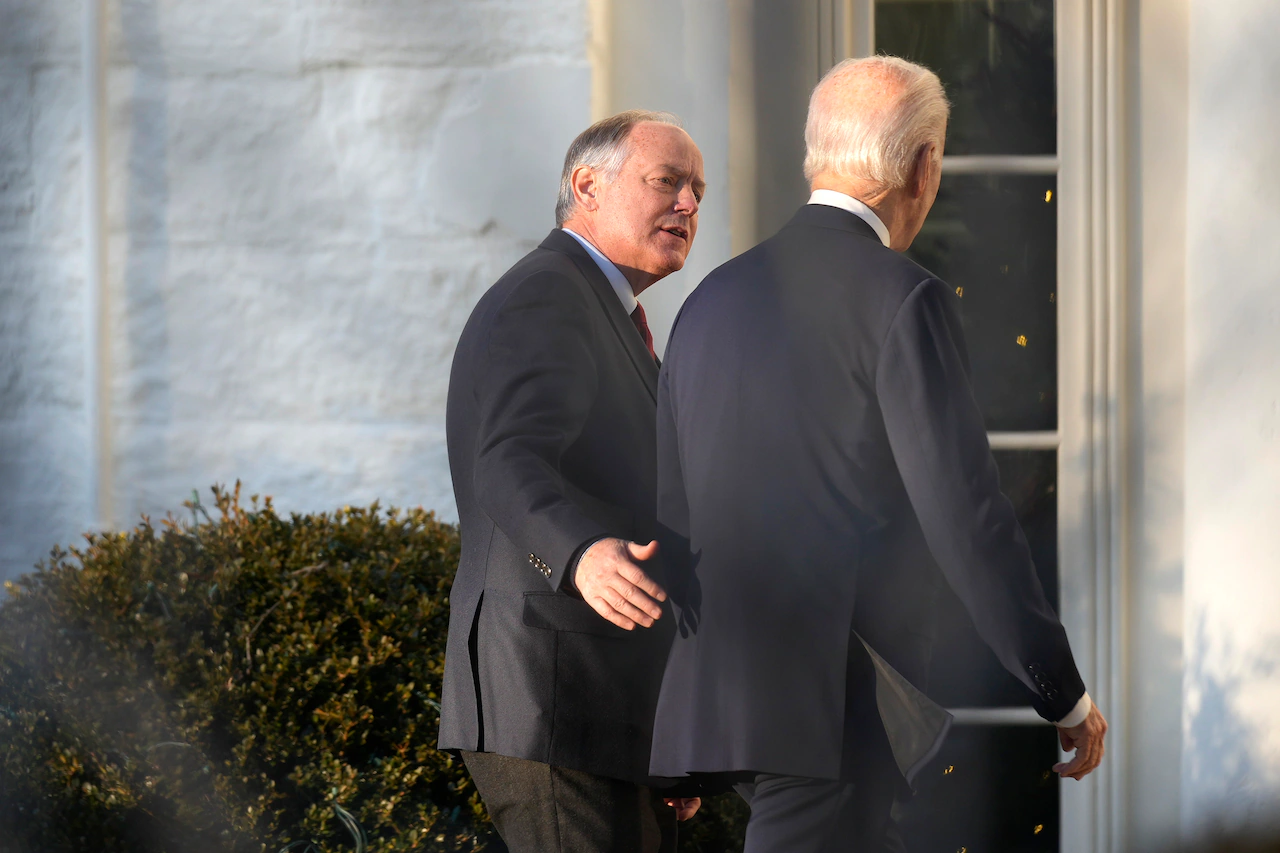Copyright cleveland.com

WASHINGTON - For nearly a decade, Steve Ricchetti occupied a singular position in Joe Biden’s political life: trusted counselor, campaign chairman, and what some called a member of the president’s “inner circle.” Now the Westlake native finds himself at the center of a congressional firestorm, defending his former boss against Republican allegations that Biden suffered from cognitive decline while in office — allegations Ricchetti categorically rejects. “At all times during his presidency, I believed that President Biden was fully capable of exercising his presidential duties and responsibilities, and that he did so,” Ricchetti told House Oversight Committee investigators in a July interview, according to a transcript released on Oct. 28 alongside a Republican report on Biden’s mental state. The 100-page report, titled “The Biden Autopen Presidency: Decline, Delusion, and Deception in the White House,” paints a damning picture of a president and accuses the inner circle of covering up his deteriorating condition. But Ricchetti, speaking voluntarily for more than six hours, offered a starkly different account: that of a president who “made these calls” and remained fully in command throughout his term. “The Trump administration’s efforts to taint President Biden’s legacy with baseless assertions about President Biden’s mental health are an obvious attempt to deflect from the chaos of this administration’s first 6 months,” Ricchetti told the committee. A Buckeye’s journey to the White House Ricchetti, 68, grew up in Westlake and graduated from Westlake High School in 1975 before earning his undergraduate degree from Miami University in Oxford, Ohio, where he served as student body president. He went on to earn his law degree from George Mason University. His path to Biden’s side wound through decades in Washington, including senior roles in the Clinton White House — he served as deputy chief of staff during the impeachment proceedings — and years as a lobbyist. In 2012, he joined Vice President Biden’s office as counselor, eventually becoming Biden’s chief of staff. Westlake High School inducted Ricchetti into its Hall of Fame during Homecoming weekend in 2018, recognizing the hometown graduate who had risen to the highest levels of government. When Biden decided to run for president in 2020, Ricchetti was his campaign chairman. After Biden’s victory, he returned to the White House as counselor to the president, a role he held until the administration’s final day. ‘We were in kind of an ongoing dialogue’ Throughout the interview, Ricchetti described his relationship with Biden as one of constant communication rather than formal, scheduled interactions. “We were in kind of an ongoing dialogue. It was a daily conversation,” he told investigators. “There wasn’t this kind of bifurcated, ‘On this day we decided to do this.’ There was just a momentum and then an understanding amongst us.” This closeness meant Ricchetti witnessed Biden’s performance firsthand, day after day. Asked directly whether he had concerns about Biden’s age and capacity to be president, Ricchetti was unequivocal: “No.” He acknowledged that Biden’s age was a political issue — something the team discussed frequently in strategy sessions. But Ricchetti drew a sharp distinction between age as a campaign challenge and cognitive fitness to serve. “I don’t think I ever had a conversation that I can recall where somebody questioned his ability to be president,” he said. “We all believed he was doing a good job.” ‘Garden variety’ mistakes or cognitive decline? The House Republican report catalogs numerous instances of Biden appearing confused, misspeaking, or forgetting names — episodes the GOP argues demonstrate cognitive decline. The report notes Biden mixed up names, required extensive staffing support, and had his schedule lightened to accommodate what the report says aides described as his limitations. Ricchetti dismissed these characterizations as unfair extrapolations from normal human behavior. “I certainly saw days when he made mistakes or he stumbled or said — mixed up a date or forgot a name or made what I consider kind of common mistakes that I could make myself, or anybody else that I knew could make themselves,” he told investigators. “Those were the kinds of mistakes that you make even as you’re under pressure or giving a speech or just the garden variety kinds of things that human beings sometimes fall into or make.” Asked whether such mistakes had increased since Biden’s vice presidency, Ricchetti said no. He grew more emphatic when pressed on the question, invoking his own experience: “I mix up names. I forget dates. I do,” he said, adding that such incidents “do not represent, in my opinion, cognitive decline. They represent mistakes that human beings make every day in the course of their lives.” Ricchetti warned that using such a standard to question a president’s fitness sets a dangerous precedent. He noted that similar criticisms could be leveled at other presidents, including the current one, pointing to instances where President Trump had made comparable verbal miscues. “I think if you look at the President’s record, at his schedule, at the work that he did contemporaneous with these mistakes or missteps or stumbles, that if you considered that in context, those to one another, there just would be no question about the President’s competence and his ability to do the job,” Ricchetti said of Biden. Age as political challenge, not incapacity While adamant that Biden remained fully capable, Ricchetti was candid about age being a persistent political challenge for the campaign and administration. “We all knew that age was an issue. All of us,” he said. “It was available in the data, we certainly could see it in the polling information, that age was a concern about the President when we were running in 2019.” The team held numerous strategy discussions about how to address voters’ perceptions of Biden’s age. These conversations included senior staff like Chief of Staff Ron Klain and Jeff Zients, senior advisor Anita Dunn, communications officials, and even First Lady Jill Biden. “We did think about how to approach age, and he always believed that just doing the job and showing everybody by campaigning or performing in the Presidency that that would answer the questions about age,” Ricchetti explained. Biden himself, Ricchetti said, never felt limited by his chronological age. “He never felt like he was his chronological age. He always felt much younger,” Ricchetti recalled. “He’s physically healthy.” The 2024 debate and decision to withdraw The turning point came with Biden’s June 2024 debate performance against Donald Trump — a moment even Ricchetti acknowledged was damaging. He described Biden’s poor showing as “an anomaly,” and said he thought a cold, cough and congestion that had affected Biden a few days before “had gone downhill rather than uphill, that was what I thought of in the moment.” When asked why Biden dropped out of the race if his cognitive abilities were sound, Ricchetti pointed to political reality rather than incapacity. “Support for him, in particular among Democratic leadership and donors, had eroded because of his performance in the debate,” he said. “And so he decided, I think in an extremely magnanimous and an extremely high-character call for a person who was in the Presidency and had already basically won enough delegates to have secured the nomination, he decided to step aside to unify the party and to give it a better chance.” Ricchetti drew a parallel to President Reagan, who faced similar questions about his mental acuity after a poor debate performance in 1984 but went on to win 49 states in his reelection. The difference, Ricchetti suggested, was political circumstance rather than capability. “The public does get to vote,” he noted. ‘A dangerous precedent’ In a forceful opening statement, Ricchetti condemned the investigation itself as politically motivated and potentially harmful to future presidencies. “Certainly one could argue, from our perspective, that the sitting President has cognitive issues, that he couldn’t remember that he had appointed the Chairman of the Fed to the Fed, that he makes mistakes every day in how he speaks or confuses Nancy Pelosi with Nikki Haley or a hundred other examples of things that,” Ricchetti said of Trump. “From our point of view, one would argue that the current President certainly is experiencing cognitive issues, to say nothing of the character of some of the things that he’s said and their truth or honesty.” He warned that the investigation’s probing into private conversations between a president and his staff could chill candid advice in future administrations. “A President is entitled to confidential advice and be entitled to privacy and confidentiality in much of the space that he operates in the White House, particularly with his most senior staff,” he said, adding that the precedent could be “applied to Members of Congress and their staffs” as well. Questions about President Biden’s views Investigators pressed Ricchetti about his recent conversations with Biden, including whether the former president had opinions about the investigation’s legitimacy. Ricchetti confirmed he still speaks with Biden regularly — “two or three times a week” until recently — and is helping him write his post-presidential memoir. He said he told Biden he would be testifying but avoided discussing the investigation’s substance to prevent any appearance of impropriety. When asked whether Biden thinks questions about his mental acuity are legitimate, Ricchetti hedged: “I think any question that the American people ask or raise about the health of a President is a legitimate question,” he said, declining to speak directly for Biden on the matter. He did say Biden believes he was “fully capable and competent in performing the job every single day” and would “certainly dispute” questions that challenge that. ‘Every Single Day’ Throughout the lengthy interview, Ricchetti returned again and again to a central theme: his belief, based on daily observation, that Biden remained capable throughout his presidency. “Did he stumble? Occasionally, yes. Make mistakes? Get up on the wrong side of the bed? He did. Every one of us did who worked for him,” Ricchetti said in his opening statement. “But I always believed every day that he had the capacity, capability, character, and most importantly, the judgment to be President of the United States.” He said there “was no nefarious conspiracy of any kind among the President’s senior staff, and there was certainly no conspiracy to hide the President’s mental condition from the American people. “I am not aware of any effort by any member of the White House staff to usurp the President’s authority to make decisions or to sign important documents without his knowledge,” said Ricchetti. " I am not aware of any effort to use the autopen on important documents without the President’s knowledge and consent. I am not aware of any effort to keep important information from the President." He concluded his statement by defending Biden’s record: “Joe Biden improved the lives of millions of Americans — importantly, including in red States — strengthened the American economy by fostering growth and lowering inflation, made COVID vaccines universally available, and invested in our country’s future.” For Ricchetti, the Westlake native who rose to become one of Washington’s most influential operatives, the verdict on Biden’s presidency should rest not on isolated verbal stumbles but on the totality of his leadership. “If you look at the President’s record, at his schedule, at the work that he did contemporaneous with these mistakes or missteps or stumbles, that if you considered that in context, those to one another, there just would be no question about the President’s competence and his ability to do the job,” he said.



